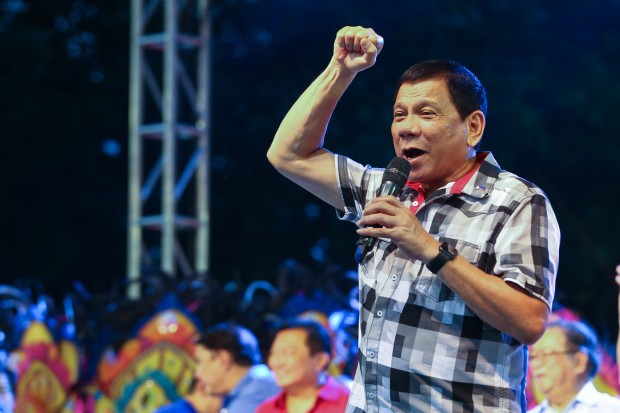The next 100 days going beyond the drug war
President Rodrigo Duterte would go full speed with his war on drugs but would make it more comprehensive. He would also give more attention to other urgent problems like poverty, infrastructure and traffic woes, and unemployment.
These are the take of four social and political scientists and analysts, who were responding to questions posed by the Inquirer, on Mr. Duterte’s next 100 days.
Q: What do you see in the President’s next 100 days? What should be his priorities? Should he go full speed ahead or recalibrate his war on drugs?
Edmund Tayao, political science professor at the University of Santo Tomas: Overall, I’m waiting for the development plan of this administration. Not sure whether this President, like the other President, will also have a slogan to guide him. But the development plan should include priorities, such as the drug war. In terms of the drug war: Full speed ahead but make it more comprehensive.
The public remains supportive because it is aware of the weaknesses of the justice system, especially in terms of policing and gathering evidence.
Carmel Abao, political science instructor at Ateneo de Manila University: The policy areas that he has prioritized are the right priorities. He has opened six spaces—antidrug war, peace with the Left, federalism, antimining, anticontractualization and foreign policy. These have never been opened before by any President.
That Mr. Duterte has focused on the drug problem is commendable. His main method of addressing the issue, however, is questionable: “militarizing” the police to arrest drug addicts and pushers without due process.
This is questionable because Mr. Duterte should be able to differentiate between drug “users” and “pushers.” For the former, drug use is a health issue and the answer lies not in a “war” but in rehabilitation.
Mags Maglana, development management consultant: We want to see more concrete moves against the oligarchs, who are responsible in a big way for the continuing poverty, criminality and corruption in our country. We fear that the President’s energies would be sapped with the inordinate focus on specific types of crimes and his getting dragged into unnecessary controversies.
The first 100 days were jarring in both positive and not-so-positive ways. The not-so-positive could undermine the positive gains and could rapidly drain the political capital of the President. Among the positive ones is the peace process with the National Democratic Front of the Philippines.
Richard Heydarian, political science professor at De La Salle University: Mr. Duterte has, quite astonishingly, amassed an unprecedented amount of political capital in a short span of time. This is remarkable given his previously outsider status and the fact that he hails from a very small political party. He enjoys a supermajority support in a legislature, while his approval ratings are higher than any of his predecessors. Set to appoint the bulk of the justices in coming years, his influence over the judiciary is bound to increase.
Q: What is the President doing right? What is he doing wrong? What should he start doing? What should stop?
Tayao: The President’s strength is also his weakness. He is very forthcoming. He says what he thinks is right. This is also his weakness. He has a tendency to be emotional. Sometimes, he puts force in his words to emphasize he means them, but in the end, the impact on his audience is negative.
For example, regarding foreign relations, I’m not sure where the President is leading us to. But if I may second-guess, he is expanding our list of allies. It’s like he’s telling the United States, we have other allies. But instead of being clear with his message and strategy, the emphasis instead is more on his words and how he says them. The message gets lost.
Abao: The misogyny of this administration needs to stop. Mr. Duterte must also stop giving the impression that his antidrug campaign is the be-all and end-all of his administration. He has to give equal attention to other important policy areas (especially those relating to economic development).
Maglana: There is no need to score political points against all forces that do not extol the President. Viewing all critical voices against the administration as something instigated by the yellow group should stop. Many times a critical view is only that, a critical view and not a move to bring back the previous administration.
We want to see this administration encourage political debates on the bases of issues and merits, rather than shut opponents down through tarring and shaming. More positive changes have to take shape and be felt soon in the realms of the economy, government services and public goods. We do not want citizens to shake their heads very early in the term of the new administration and say: “Wak-wak man diay: walay kalainan, walay kausaban (No difference, no change). —INTERVIEWS BY GERMELINA LACORTE, AND ALMI ATIENZA, RAFAEL ANTONIO AND KATE PEDROSO, INQUIRER RESEARCH















